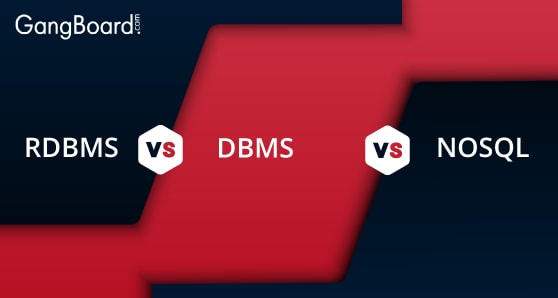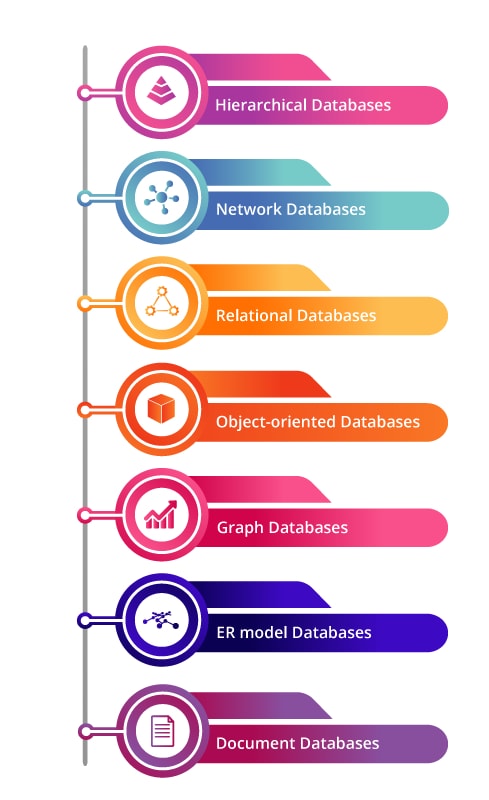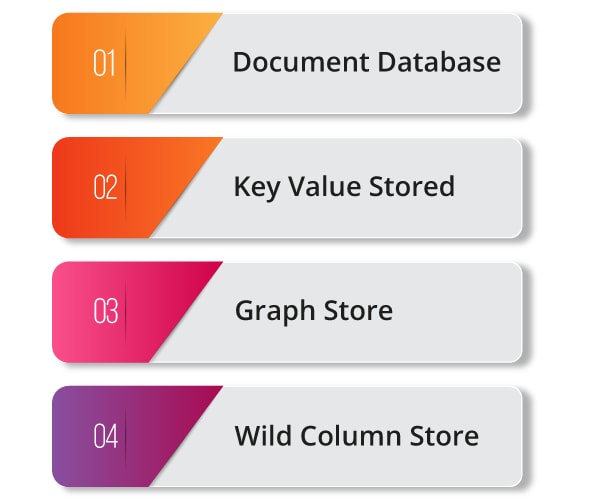
RDBMS Vs DBMS Vs NoSQL
RDBMS Vs DBMS Vs NoSQL
What is Data?
It is a piece of information. Example: Name of the Person, Age, Employee ID giving the information about a particular person
What is a DataBase?
The Database is a term which is a collection of Data, Database used to Store and Manipulating the Data.
Let’s have an Example WhatsApp when we are taking a backup to our Google Drive it needs to store the data to the drive of all our Message, Videos, Pictures, etc.
We can able to give Infinite Examples for Database usage.
Database Types
- DBMS
- RDBMS
- NoSQL
DBMS
A full form of DBMS is Database Management System, this is a set of software program which is used to manipulate, control and store the data. This set of program which is used to handle the manage the database. DBMS manipulate the Data format, Field names, record structure, and file structure.
A DBMS is used to serves between the end-users and the Database. And the DBMS supports retrieving, updating, deleting and modifying the data.
A DBMS needs the Comprehensive database software which is used to handle the rows and columns. We can able to control. Enable the Admin functions with the huge range of operations like Monitoring, Tuning, and Backup Recovery
Benefits of DBMS
We can able to handle the huge amount of Data, We can able chief among them with the features of Data Handling, Data Sharing, Integrity, and Security and it is easy to handle Data Redundancy in the Database System.
DBMS Category
RDBMS
Relational Database Management System is the most famous among the Database, we are calling this as relational Database meaning is there is a relationship between the data stored in the database
A row represents the record and the column represents the Attribute. In RDBMS every individual field represents the data value. To Query or handle the RDBMS we need SQL. The SQL or See- Quel is used to handle the Insert, delete, modify, and update queries in an effective way.
Other hands SQL is used in Development and Data Analytics and to write scripting for Integration.
Benefits of RDBMS
- It supports better Data redundancy
- It allows Easy Integration with the Applications
- It gives more Secure
- It having good data Access through the users.
- Easier to Modify, Access and to Learn
Example of RDBMS
- My SQL
- Oracle
- SQLite
- SQL Server
Let’s have a deep Description of the Relationship:
| Course Id | Student Name |
| BES1 | Mani |
| BES2 | Karthic |
| BES3 | Ismail |
| Course Id | Trainer Name |
| BES1 | xxx |
| BES2 | xyz |
| BES3 | zzz |
Now, these two data which is actually having a link between each other for example each dataset has a relation by Course ID.
NoSQL
NoSQL is a Next-Generation Database which is used to store the data and retrieval the data, it is known as NoSQL database meaning it won’t need the Query Language this is no Structured Query Language, it having distributed Architecture and most of them are open Source
The Reason we are going with NoSQL is due to the increase of the Data. The Massive Data grew companies like Facebook, Google is preferring NoSQL because even increasing the Data size it won’t affect the Performance
No SQL doesn’t follow the strict schemas like Relational Models, with our NoSQL we can’t able to expect the Feature called ACID i.e. Atomicity, Consistency, Isolation, and Durability.
NoSQL having the capability of horizontal Scaling which means we can able to add or remove the capacity of the machine later and Main Feature of our NoSQL is we can able to add or remove the memory capacity or clusters in NoSQL Database
The NoSQL Database is having the capacity to handle a large number of Pictures, videos which streaming live, NoSQL which is giving the Scalability and Reliability to handle a large amount of data
NoSQL Category
Examples for NoSQL
MongoDB, Cassandra, Redis, Couch DB, Big Table, Hbase, Amazon Dynamo DB
Click Here-> To Know What DataBase does Facebook Use
Difference between DBMS, RDBMS, and NoSQL
| DBMS | RDBMS | NoSQL |
| Stored Data as File | Stored Data as Table | Stored data as Document |
| IT is a hierarchical form of structure | It is a tabular structure where the header and columns are there | It is document-based where key-value pair based storage |
| It won’t support Integrity | It supports Integrity constraints | It doesn’t support Integrity |
| Low Software and hardware need | High level of hardware and software needed | Commodity Hardware needs |
| It is part of ACID properties ( Atomicity, Consistency, Isolation, and Durability) | It also based on ACID properties | It follows the CAP theorem ( Consistency, Availability and Partition tolerance ) |
| There is No Security | It provides a high level of security | Security is very weak comparatively |
| Data needs to Access Individually | Data can be access to Individual or Multiple | Data Accessing based on Key |
| No Relationship between Data | It is having Strong Relationship | Poor or Weak Relationship |
| Data Redundancy is Easier | Data Redundancy is not possible | Entities relation with others we can able to describe later |
| Does not support Normalization | RDBMS can be Normalized | Doesn’t require Normalization |
| Doesn’t support distributed Database | It support distributed database | It is a non-relational largely relational database |
| This is suited for Small quantity of data | This is suitable of large quantity of data | This is used to handle a huge amount of data like images, videos, etc.. |
| Doesn’t support Client-Server Architecture | It is well suited for client-server Architecture | It is not suitable for client-server architecture |
| It is used to handle structured Data | It handling Structured data with Manipulating the data | It is used to handle the Semi-Structured and Unstructured data |
| It supports Single User | It supports multiple users | It supports multi-level clustering |
| It is used by banking, Airlines, Universities, Telecommunication, etc | The same use cases of DBMS | It is using in IoT, BigData, Mobile and Web App |
| Example: File System, XML | Example: MySQL, Oracle, SQLite | Example: MongoDB, Cassandra |





 +1 201-949-7520
+1 201-949-7520 +91-9707 240 250
+91-9707 240 250